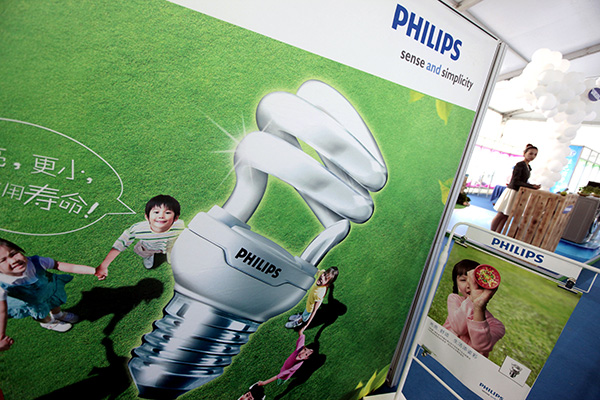 |
|
Philips' booth at a technology and science fair in Beijing. [Photo provided to China Daily] |
Philips Lighting, a business sector of the Netherlands-based company Royal Philips NV, will deploy more resources and manpower in China's lower-tier and western cities over the next three years.
The Dutch company will introduce more products, including connected lighting systems, LED lighting and smart lighting products, and large-scale lighting equipment for the sport, hospitality and manufacturing sectors into China.
The global market value of intelligent lighting products is expected to reach $8.14 billion by 2020. In China, developing and promoting the use of such products has been included in the country's Made in China 2025 strategy, according to MarketsandMarkets, a market research and consulting company based in India.
John Wang, president of Philips Lighting (China), said in comparison with Western markets, Chinese consumers have distinctive preferences and habits. For example, Chinese consumers are increasingly conscious of sustainability and resource efficiency.
"Particularly when LED is promoted in China, local consumers have also increasingly identified themselves with LED's energy efficiency and long service life. China is also one of the fastest-moving countries in terms of LED transformation," said Wang.
Philips Lighting currently has branches in 33 cities and brand stores in 300 cities in China. Philips Lighting is keen to seize opportunities that arise from China's industrial upgrading and urbanization, because the country's new focus is on quality urban development, as well as green, low-carbon and sustainable growth such as promoting the use of LED products and energy-saving automobile products.
Even though China is a big market for Philips Lighting, manufacturers in China accounted for 20 percent of global LED production volume. China manufactured 177.45 billion LED lamps in the first half of 2015, up 37.33 percent year-on-year, according to the Ministry of Industry and Information Technology.
Eager to enhance its earning ability via its cutting-edge technology, Philips Lighting has accelerated its research and development pace on low-cost wireless LED lamps.
China's fast-growing 4G network would help build a solid application foundation for both consumers and manufacturers, as well as reduce the research and development period for new products.
Most of Philips Lighting's products are developed in China. It is also partnering with domestic companies including Xiaomi Corp, China's largest smartphone maker, by investing more in technology and product research and development.
Wang said the company also found that consumption patterns are shifting in China.
Apart from traditional physical stores, online shopping sites have become another important channel for retailing, with more consumers buying lighting products through online platforms.
As China is Philips Lighting's second-largest overseas market after the United States, it has more than 1,000 researchers in China, as well as 13 plants and six research and development institutions.
Zhao Ying, a researcher at the Chinese Academy of Social Sciences' Institute of Industrial Economics in Beijing, said China is already the global leader in applying clean-energy and energy-efficient products, as well as making big-ticket investments in this sector.
"LED lighting, electric vehicles, wind power and solar energy, which use less power but also illuminate China's green development will become a key differentiating factor in determining a country's competitiveness," Zhao said.
